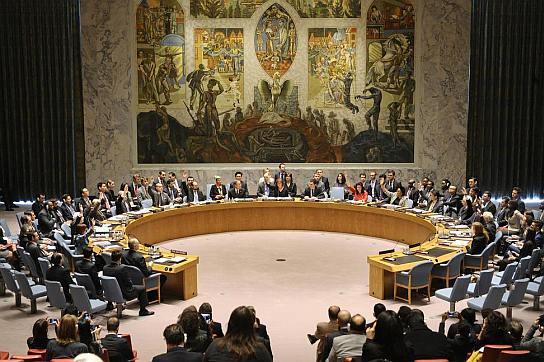Eventlist
Event

- Title:
- Open Seminar: In the name of international peace and security: Greece's candidature to the UNSC
- When:
- 10.09.2015 19.00 h
- Where:
- Greek Centre Melbourne (Mezzanine) - Melbourne
- Category:
- Education
Description
Lecturer: Sophocles Kitharidis
Entry: FREE
Synopsis
Since the inception of the United Nations in 1945, Greece has demonstrated its political commitment and dedication to maintaining international peace and security within the global arena. Being elected as a Non-Permanent Member of the United Nations Security Council in 1952-1953 as well as in 2005-2006, Greece is preparing to submit its candidacy for the United Nations Security Council for 2025-2026 and for the United Nations Human Rights Council in Geneva for 2019-2021. When Greece first considered applying for membership in the United Nations Security Council, doubts were expressed by numerous politicians and journalists on the necessity of such a move – given the ability for Greece to "judge" and "critique" its regional friends and political allies. Greece's first Ambassador to the UN Security Council, Alexis Kyrou, argued that a policy of not participating in institutions and not being active in international relations would be "...of an obvious castrating nature...not realistic in today's international conditions". It was obvious to Ambassador Kyrou that "[l]ife contains undoubtedly many risks, but the triumph of victory comes to those who are alive and to those who are fighters. The Greek People, after all this struggle...deserve a diplomatic service that is alive, vigorous, modernized, bold, a diplomacy which is not stuck to the comfortable but barren motto 'don't deal with whatever is already bad'."
There is no doubt that Greece's membership to the United Nations Security Council has had the positive effect of developing the country's portfolio and bringing it closer to the international political stage, in addition to promoting, inter alia and to the extent possible, the idea that international law is the supreme rule by which the international community should abide by; an idea which resonates throughout Modern Greece's history since its establishment as a modern state in 1830. Conversely, running and maintaining a seat on the United Nations Security Council has been a rather costly endeavour due to the nature of securing a country's membership.
This lecture will review Greece's participation in the San Francisco Conference for the creation of the United Nations and will analyse its participation over its previous two terms serving as a Non-Permanent Member on the United Nations Security Council. Looking over the UN Security Council resolutions put forward by Ambassador Alexis Kyrou and Ambassador Adamantios Vassilakis, this lecture will explain the significance of international diplomatic voting, including the issuing of international statements when faced with regional threats to peace and security. In doing so, it will discuss Greece's involvement within this political landscape critiquing its dedication towards international peace and security, its involvement in United Nations peacekeeping operations as well as what the future may hold if Greece is elected in 2025-2026 as a Non-Permanent Member.
Bio
Sophocles Kitharidis is an international law adviser to the International Affairs Division of the Thai Ministry of Justice as well as a Legal Policy Officer for the Victorian Government. Recently completing his Master of Laws in Public International Law at the University of Melbourne, Sophocles' specialisation has focussed on international law and the use of force, the laws of armed conflict and the laws governing UN peacekeeping operations.
From a practical perspective, Sophocles has worked and interned widely within the international arena including postings at the Australian Permanent Mission to the United Nations in New York, as well as on the Security Council when Australia was a Non-Permanent Member between 2013-2014, at the International Affairs Division and Human Rights and Liberties Protection Divisions of the Thai Ministry of Justice in Bangkok, and he was the Australian Representative to the NATO Youth Summit in Brussels, where he presented on the security situation in the Caucasus region. In addition, Sophocles was recently invited to attend the 13th United Nations Congress on Crime Prevention and Criminal Justice in Qatar, as an Individual Expert in Public International Law, where he was briefing the Thai Delegation on a number of issues including human rights, rule of law, the rights of the child and UN peacekeeping operations. He has also worked in the private sector.
Sophocles has published in the fields of public and private international law in leading academic journals. In addition, he is on the executive board of the International Law Association (Victoria Branch), and is Secretary of the Australian Hellenic Council, the peak national body representing Greeks-Australians in Australia.
Donors
During the course of the year considerable expenses are incurred in staging the seminars. In order to mitigate these costs individuals or organisations are invited to donate against a lecture of their choice, please email: This e-mail address is being protected from spambots. You need JavaScript enabled to view itFor this seminar we'd like to thank the following donors: Dr Marinis & Mrs Maria Pirpiris and Australian Hellenic Council (VIC)
You too can donate against one or more seminars and (optionally) let your name or brand be known as a patron of culture to our members, visitors and followers, as well as the broader artistic and cultural community of Melbourne.
We also thank the seminars' corporate sponsors:

Venue
- Venue:
- Greek Centre Melbourne (Mezzanine) - Website
- Street:
- 168 Lonsdale Street
- Postcode:
- 3000
- Suburb:
- Melbourne
- State:
- VIC
- Country:
-

The Mezzanine floor (press "M" in the elevator) of Greek Centre Melbourne - located at the corner of Lonsdale and Russell streets in Melbourne, Australia.
EventList powered by schlu.net

